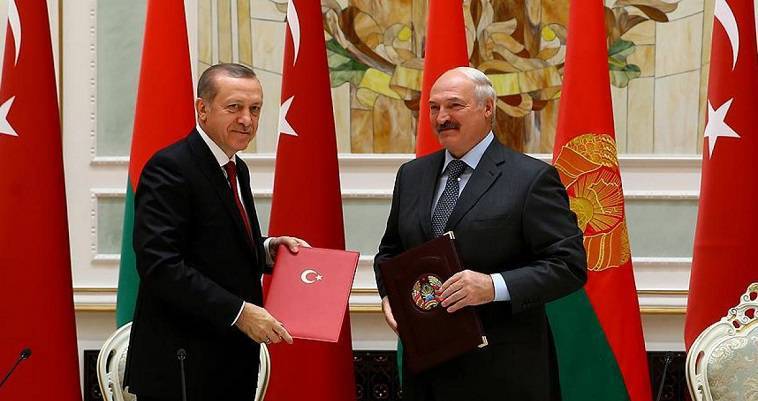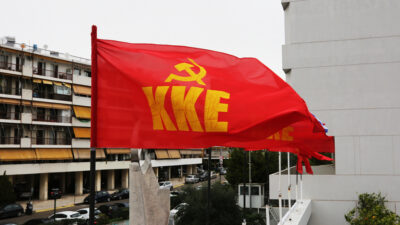Vagelis Sarakinos: The “dictator” Lukashenko, the “democrat” Erdogan and an opportunity for Mitsotakis
18/08/2020
The noose around Belarus and Lukashenko is tightening on the occasion of the demonstrations of citizens who are complaining of fraud in the August 9 elections. The United States and NATO are closely monitoring the situation as the EU will convene an emergency summit on Wednesday, with Germany, which is leading the way, preparing the ground for extending sanctions already under way.
At the same time, Lukashenko turned to Putin, who promised him military assistance and joint action in the event of an external threat. At the same time, the President of Belarus complained that NATO was gathering troops on the western border of his country, something that the Alliance rejected. Trump, who in his statements described the situation in the former Soviet republic as “horrible”, is also closely following the developments.
Meanwhile, the alleged leader of the opposition, Svetlana Tihanovskaya, said from Lithuania, where she took refuge last Tuesday, that she intends to lead the country! For his part, Lukashenko, who has his son Nikolai by his side, who often appears as a possible successor, said as early as Sunday at a rally of his supporters that he was ready to start reforms. Today, he made his initial statement even more special, emphasizing that he is willing to share power and change the Constitution, but not under pressure.
Lukashenko is one thing, Erdogan is another
Speaking to striking workers, Lukashenko defended the election result and ruled out new presidential elections. However, he said he was ready even to hand over power, but only after a referendum. “Yes, I am not a saint. You know my hard side. I am not eternal, but if you oust the first president, you will drag along the neighboring countries and everything,” he warned. It does not appear, however, that he persuaded the strikers, who continued to demand his resignation.
NATO reiterated today that it is not a threat to Belarus, while member of the Alliance and neighboring Lithuania, through its foreign minister described any Moscow military support for Minsk as an “invasion”. However, what makes an sad impression is the EU’s contemplation of sanctions, at a time when it has not shown the same willingness for Turkey, which blatantly violates the sovereign rights of two of its member states, Greece and Cyprus.
Under pressure from Berlin, which has been at the forefront of criticism of Lukashenko, Charles Michel announced an emergency summit on Wednesday, fully endorsing Belarus’ opposition allegations of fraud and denouncing violence against protesters. At the same time, the President of Germany calls on the Belarusian army not to turn against the citizens, while the Social Democrat Minister of Finance and Vice Chancellor of Germany, Olaf Solz, described the President of Belarus as a “dictator”.
Endless hypocrisy
The strange thing is that both the European Institutions and Berlin did not react in the same way when Erdogan canceled Imamoglu’s victory in Istanbul. They also do not show the same sensitivity, expressed in sanctions and not in statements, for the unbridled violation of the rights and freedoms of Turkish citizens belonging to ethnic, religious and social minorities.
Unless Berlin and Brussels really believe that Lukashenko has imprisoned more Belarusians than Erdogan has imprisoned Turks. If they do not remember, we could remind them that the Turkish president, since the day after the failed and controversial coup, has arrested and imprisoned everything that moves and breathes around him.
It is also paradoxical that at Wednesday’s summit, heads of state such as Hungary’s Orban and his Polish counterpart will vote to impose sanctions on Belarus for violating human rights and civil liberties. And they will do so when they themselves are accountable to the European Institutions for disrespecting the Rule of Law.
The EU’s study of sanctions against Belarus is dictated by German interests in the region, which date back many centuries to the late 12th century and the Hanseatic League (a union of guilds, cities of northern Germany, which sought and finally managed to dominate for centuries the trade of the Baltic and part of the North Sea).
Challenge for Greece and Cyprus
The attitude of the Europeans, Brussels and Berlin, on the issue of Belarus, however, is a challenge for Greece and Cyprus. First and foremost, because for the affairs of a third country they are convening a Summit, while for the violation of the sovereign rights of two partner countries they limited themselves to the meeting of the Foreign Ministers.
Secondly, because they put off for the unforeseeable fututre any sanctions against Turkey, while within a week they ask for an extension of the sanctions against Belarus.
Michel, apparently in an attempt to anticipate the reactions, but possibly taking into account the “silence” of Athens and Nicosia, took care to confirm in the invitation he sent for Wednesday, the special Summit, on September 24 and 25, on the Eastern Mediterranean issue. Mitsotakis and Anastasiades must, however, be careful.
Athens and Nicosia, at Wednesday ‘s meeting, of course, being EU members must be in favor of respect for the rule of law and freedoms in Belarus. As far as sanctions are concerned, however, they should set a condition from the outset. In order to start a debate on sanctions in Belarus, sanctions must first be imposed on Turkey and Erdogan. In fact, these should be somewhat stricter than the EU sanctions on Putin and Moscow for Crimea and Eastern Ukraine, where Germany also has interests. Otherwise, a veto is always an option.





